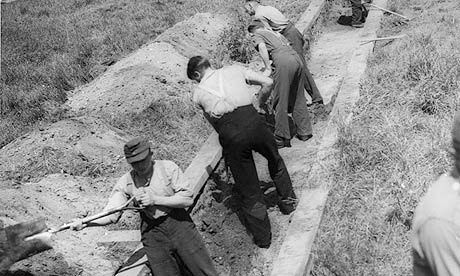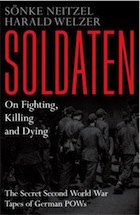With its cult of destruction and self-sacrifice, national socialism might have been designed for adolescence; Nazi party members indulged Teutonic pagan myths and sub-Wagnerian kitsch. Symbols appropriated from the Wotan and Beowulf legends (shields, breastplates, lances) helped to instil a nationwide conformism and sense of belonging. While not all Germans were swayed by Hitler, the majority were. Th Hitler Youth, in particular, showed a dog-like devotion to the Führer, and scorned the Judaeo-Christian morality of compassion for the weak. Gypsies, Jews, homosexuals and the mentally disabled were "useless mouths" deserving of death.
Soldaten, drawing on secretly recorded conversations among SS and Wehrmacht prisoners of war, shows that ordinary Germans were more complicit in the liquidation of European Jewry than historians have previously supposed. "Soldiers traded rumours so furiously that we must assume that nearly all of them knew" that large numbers of Jews "were being murdered", say the authors. What's more, some soldiers killed Jews not simply because "orders were orders", but because they enjoyed killing. Killing Jews was "fun", as one PoW says; he killed without any feeling of corruption or moral failure. The extermination of all Jews meant even newborns, for they too were potential enemies of the Third Reich. In wartime Germany, murder was made into a civic virtue.
The cruelty shown by the German army to Jewish women and children is one of Soldaten's most harrowing themes. The Italian novelistCurzio Malaparte reckoned that Germans feared the "weak" and "defenceless" in a way they did not fear comparably powerful military opponents. ("That which drives the German to cruelty, to deeds most coldly methodical and scientifically cruel, is fear of the oppressed and the sick ... fear of the Jews.") Most soldiers tried to hide this mysterious "fear" from each other on the battlefield, but they were driven to talk about it in private when their guard was down. Away from their captors, PoWs were especially loquacious; they could never imagine that their utterances would one day be published.
After their capture by allies, thousands of German soldiers were interned and covertly monitored by British intelligence. Conversations reckoned to be particularly interesting or fraught with strategic information were recorded on to wax cylinders and subsequently transcribed. Hundreds of thousands of transcript pages were consigned to British and US archives. Declassified in 1996, they remained forgotten until the German historian Sönke Neitzel "discovered" them in 2001. The bulk of conversations had been recorded, it seems, at a detention centre in Trent Park, near Cockfosters tube station in north London. Excited by his discovery, Neitzel asked a distinguished social psychologist, Harald Welzer, to help him decipher the mass of interrogations dating from 1940 to 1945.
The result has been a bestseller in Germany, though a controversial one. Since the war's end, German historians have argued that many of the nation's 18 million Wehrmacht soldiers were honourable men, who acted with due probity at the front. Soldaten suggests a different story. The conversational exchanges (as published here) reveal inhuman actions carried out not just by the SS and Gestapo, but by German soldiers of every rank and service.
Lieutenant Colonel August von der Heydte, for example, confesses to his fellow PoWs how an after-dinner execution of 30 Polish Jews was set up to resemble a pheasant shoot. "Each guest was given a shotgun; the Jews were driven past and everyone was allowed to have a potshot at a Jew." The mass killing of Jews was considered such entertainment that town mayors, police, Wehrmacht orderlies and other curious onlookers turned up at the death pits to take photographs and even jeer. "Execution tourism" seemed to have become such a problem by 1942 that the SS security service had to issue special orders curtailing it.
According to the authors, Nazi executioners were even, at one level, fearful of Jewish children. "They seized three-year-old children by the hair, held them up and shot them with a pistol and then threw them in," says Lieutenant General Heinrich Kittel in 1944 of events he had witnessed three years earlier in Russia. The division of labour at the killing fields of Babi Yar, where the Wehrmacht helped to murder 33,771 Jews in a single operation, made the contribution of any one person seem "unimportant". The soldiers felt no more responsible, personally, for killing the Jewish civilians than did servile Auschwitz functionaries. Typically, Wehrmacht personnel ensured that their concern was limited to their own special competence (the registration of Jewish prisoners, the punctual arrival of death squads). In this way, they were able to ignore the moral consequences of their work.
As these intelligence transcripts show, many soldiers thought nothing of executing Jewish women after having sex with them. In Hitler's war against "non-Aryan" peoples, soldiers were given the licence to abuse captive women; they became gloating and predatory. "There were some really attractive women there," says a Lieutenant Priebe of Jews captured in Russia, adding: "You could really have called them 'ladies'."
Some readers may flinch at the firsthand accounts of pleasure taken in rape and destruction ("Never in my life have I enjoyed anything more than the time when we smashed up the synagogues"). It was a rare German soldier who cared to distinguish between military and non-military targets (though other nationalities were also guilty of this).Soldaten raises unsettling questions about the fate of civilians in the firing line. It provides an essential documentary record; seldom has surveillance been put to such important use.
• Ian Thomson is working on a book about the Baltic city of Tallinn during the second world war


No comments:
Post a Comment